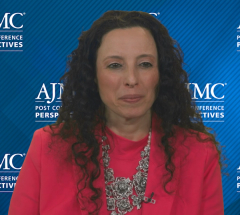
Examining Treatment Paradigms for Patients with Hypercholesterolemia
Hypercholesterolemia impact on cardiovascular outcomes is explored by a key opinion leader.
Erin Michos, MD, MHS: [CLEAR Outcomes is] 1 more trial that shows that nonstatin therapy lowers LDL [low-density lipoprotein] and can lower major adverse cardiovascular events. There’s nothing magical about statins per se. Statins are still the first-line therapy for primary and secondary prevention because we have overwhelming evidence for their efficacy, and they’re a very safe class of medicines. But there aren’t any magical properties of statins. It’s all about LDL lowering. If a patient can’t tolerate a statin or can’t tolerate a statin at a high-intensity dose to get their LDL to the range we want it to be, we can use these nonstatin options, like PCSK9 monoclonal antibodies.
For every 1 mmol/L of LDL reduction—about 39 mg/dL—that can reduce major adverse cardiovascular events by 22%. That comes from data from the Cholesterol Treatment Trialists’ [Collaboration] analysis. If you look at where CLEAR Outcomes fits in, they had a reduction of around 29 mg/dL of LDL. That’s around 0.6 mmol/L… Right on that same line, we expect about a 15% reduction in major adverse cardiovascular events. We saw the event reduction that we were expecting by the degree of LDL lowering, so that emphasizes that it’s about the LDL.
In this 40-month trial, we didn’t see a reduction in cardiovascular mortality, but none of these nonstatin therapies—including the PCSK9 monoclonal antibodies and ezetimibe—has demonstrated reduced cardiovascular mortality. That’s partly because these trials generally have shortened duration, and sometimes it can be hard to reduce death on the background of another standard medical therapy. But reducing major adverse cardiovascular events, reducing morbidity from heart attacks and strokes and revascularizations, is very important for our patients. It’s also very costly for health systems of these events, so it’s important to prevent.
Hypertension or hypercholesterolemia are major risk factors for substantial cardiovascular morbidity, with an increased risk of heart attacks, revascularization, strokes, heart failure, and the list goes on. This is why we need to have a focus on primary prevention, treating the risk factors up front to prevent the downstream complications. We spend so much time mopping up the floor. The patient has an event, and we’re trying to onboard medicines, but they already have a lot of health care costs related to their disease, If we can put more emphasis on primary prevention and even primordial prevention—trying to prevent the risk factors from occurring in the first place—from a health system [perspective], this would be much more cost-effective.
This is why I get frustrated when I see a lot of denials for things like GLP1 receptor agonists for the treatment of obesity. Obesity is a serious chronic disease that is associated with all kinds of things: substantial morbidity, heart failure, atrial fibrillation, fatty liver disease, osteoarthritis. If we can treat obesity, we can prevent a lot of these costly downstream effects. It’s shortsighted not to cover the cost of effective therapies that we know can treat patients because it will save money in the long term by preventing downstream morbidity from these chronic diseases.
Transcript edited for clarity.
Newsletter
Stay ahead of policy, cost, and value—subscribe to AJMC for expert insights at the intersection of clinical care and health economics.










